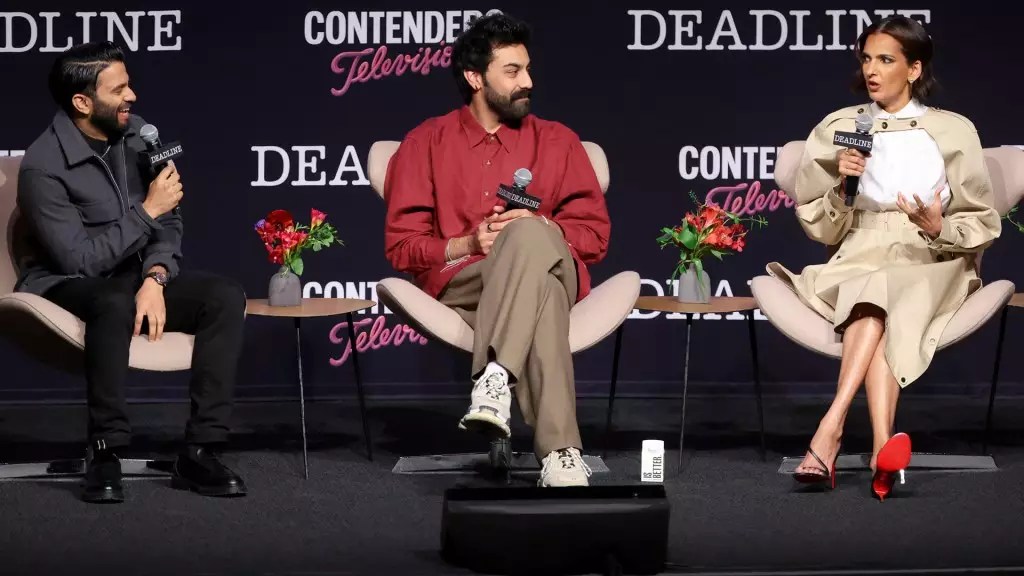In the evolving landscape of television, the juxtaposition of seemingly incongruous themes is increasingly common. Hulu’s new comedic series, *Deli Boys*, shines as a beacon of this innovative storytelling approach, particularly through the striking character of Lucky Auntie, played by Poorna Jagannathan. This character encapsulates the intricate balance between traditional femininity and the rugged bravado typically reserved for male crime figures, reminiscent of a blend between Tony Soprano and The Real Housewives of Orange County. This daring representation is not merely an afterthought; it is a conscious pivot initiated by the show’s creator, Abdullah Saeed, who was inspired to shift gender narratives after attending a transformative talk by the pioneering Geena Davis.
A Character Layered with Complexity
Lucky Auntie’s portrayal is a revelation. Originally intended for a male character, the transition to a strong female lead facilitates a much-needed discussion about the flexibility of gender in character development. Jagannathan’s embodiment of a multifaceted crime boss challenges the notion that complexity is exclusive to traditionally male roles. In a stimulating twist, she allows her character to adopt both a fierce exterior and a tender demeanor, gracefully juxtaposing violence with nurturing. “Lucky does that with these two,” she states, referring to her nephews in the show. “She wipes food off their mouths and blood off their mouths; whatever needs to be wiped off, she will do it.” This duality enriches the narrative, allowing viewers to see that strength and softness can coexist in a single character—a refreshing perspective in television storytelling.
The Power of Influence in Character Development
The behind-the-scenes influence of industry trailblazers like Geena Davis cannot be overstated. Her advocacy for greater representation and nuanced storytelling prompted Saeed to reevaluate the gender dynamics within his script. “Look at your script — if you could turn two men into women and it works, do it,” Davis advised, effectively encouraging a creative revision that leads to authentic diversity. This pivotal moment tells us that the conversation surrounding gender roles in media isn’t solely about achieving representational parity. It is about transforming how these characters are written and the roles they embody in society.
Moreover, Jagannathan’s role embodies a stark contrast to the typical portrayals of South Asian women, who are often relegated to stereotypical narratives. Instead, she brings depth and layers to Lucky Auntie, a character who operates on the fringes of societal norms. In a highly male-dominated genre, this is a bold step forward, allowing her to wield weapons while still engaging in familial tenderness—a commentary on the spectrum of womanhood often overlooked in mainstream media.
A New Standard for Female Characters
Critics often lament the narrow portrayals of women on television, particularly within genres like crime. Yet, *Deli Boys* defies these limitations by presenting its viewers with a protagonist who exudes a visceral energy seldom seen. The character of Lucky Auntie breaks boundaries, representing a new archetype: the fierce protector whose violence contends with a deeply ingrained nurturing instinct. This duality resonates powerfully with today’s audiences, reflecting a contemporary understanding that women can embody both fierceness and vulnerability without compromising their authenticity.
Asif Ali, Jagannathan’s co-star, succinctly encapsulates this balance, noting how she brings a unique softness to a character expected to be mostly “badass and hardcore.” This nuanced performance invites audiences to rethink their understanding of strength, suggesting that courage is as much about physical prowess as it is about emotional intelligence and empathy.
Stream This Groundbreaking Series
The combination of humor, danger, and familial ties in *Deli Boys* adds depth to a genre that often thrives on superficial portrayals. The series invites audiences to rethink not just the roles of women in crime dramas but in all storytelling contexts. Every layer of Lucky Auntie’s character—her assertiveness and her nurturing tendencies—represents a duality that truly captures the essence of modern femininity. As viewers, we are encouraged to engage deeply with this character who defies traditional storytelling molds, ultimately challenging us to appreciate the complex representations of women in media that are actively evolving today.
